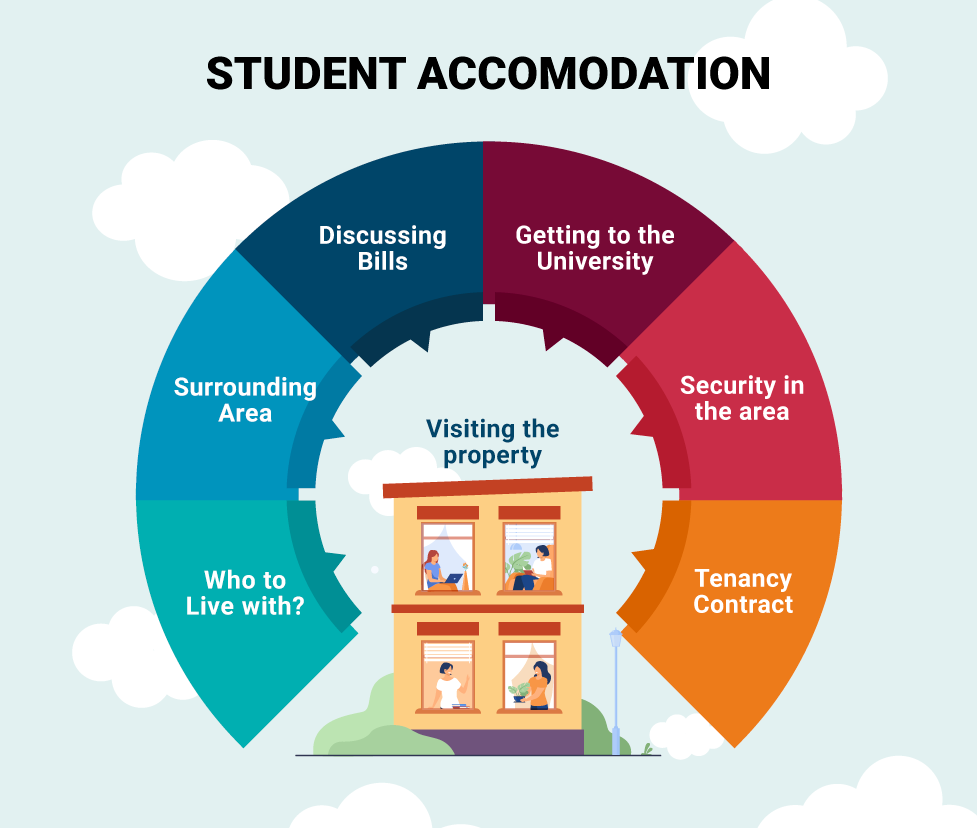Hello there, fellow international student! If you’re reading this, you’re probably about to embark on the same exciting journey I embarked on a while back – studying in North Cyprus. As an international student who has called North Cyprus home, I’m thrilled to share my personal experiences and insights into securing student accommodation in this stunning Mediterranean destination. Whether you’re headed to Girne, Lefkosa, Lefke, or Magusa, knowing the ropes can truly make all the difference in finding the perfect place to call home during your academic adventure.
Knowing Your Rights as an International Student Tenant

Before we delve into the practical steps, let’s first understand our rights as international student tenants. It’s crucial to be aware of these rights, as they empower us to make informed decisions and ensure a smooth living experience. Here are some key tenant rights, from one international student to another:
1. Right to a Safe and Habitable Environment : As international students, we deserve to reside in a safe and habitable environment. Our landlords must maintain the property in good condition, ensuring basic amenities like water, electricity, and heating are functional. This includes regular maintenance and timely repairs. If any repairs are needed during your tenancy, it’s essential to notify your landlord in writing and request a prompt resolution. Keep copies of all repair requests and communication.
2. Right to Privacy : Your privacy is equally important as an international student. Your landlord cannot enter your rented space without your permission unless there is an emergency. Ensure that your lease agreement explicitly outlines the terms regarding landlord access to your accommodation. Additionally, consider installing curtains or blinds for added privacy.
3. Right to a Fair Lease Agreement : Understanding the lease agreement is crucial. It should clearly outline the terms and conditions, including rent, security deposit, and lease duration. As international students, we should familiarize ourselves with the local laws and regulations that apply to rental agreements. Be sure to read and understand every clause before signing. If you have any questions or concerns about the lease terms, seek clarification from your landlord or university housing department. Document all lease-related correspondence.
4. Right to Request Repairs : Should maintenance issues arise, we have the right to request repairs, and the landlord should address them promptly. Ensure you communicate repair requests in writing for documentation. Keep a record of all communications with your landlord regarding maintenance issues, including dates, descriptions of the problems, and responses. Follow up on repair requests to ensure timely resolution.
5. Right to Receive Your Security Deposit : At the end of your lease, you have the right to receive your security deposit back, provided there are no damages beyond normal wear and tear. As international students, understanding the process of security deposit return is crucial. Ensure you document the condition of the property upon moving in and before moving out to avoid disputes. Discuss the process of security deposit return with your landlord, including the timeline for its return and any deductions, if applicable. Retain copies of the move-in and move-out inspection reports.
Step 1: Early Research and Planning
Now, let’s get into the practical steps to secure your student accommodation. As international students, we understand the importance of careful planning. Here’s what you need to do:

a. Determine Your Budget : Managing finances as international students can be a challenge. Begin by setting a realistic budget, considering rent, utilities, groceries, transportation, and other living expenses. Knowing your financial limits is essential for a stress-free stay. Create a detailed budget that accounts for all potential costs, including unexpected expenses, and consider setting aside a small emergency fund.
b. Explore Your Options : North Cyprus offers various types of student accommodation, and as international students, we should consider our options carefully. Research and consider on-campus dorms, off-campus apartments, and shared houses based on your preferences and budget. Compile a list of potential housing options, along with their pros and cons. Review your budget periodically to ensure you stay within your financial limits.
c. Check University Resources : Many universities in North Cyprus offer on-campus housing, which can be particularly convenient for international students. Check your university’s website or contact the housing department to explore these options. Apply early, as on-campus housing can fill up quickly. Additionally, inquire about any additional services or amenities included with on-campus housing, such as meal plans or laundry facilities. Attend any housing orientation sessions provided by your university for valuable information.
d. Seek Recommendations : Connecting with fellow international students can be incredibly helpful. Seek recommendations from current international students or alumni who have studied in North Cyprus. They can provide valuable insights into the best areas to live, affordable housing options, and landlords to consider or avoid. Join international student-related social media groups and forums to connect with others and gather recommendations. Ask for tips on budgeting and managing living expenses in North Cyprus.
Step 2: Decide on Your Preferred City

North Cyprus is divided into several vibrant cities, each with its unique charm and appeal. Let’s explore the options from the perspective of international students:
a. Girne (Kyrenia): Girne, known for its beautiful beaches, offers a variety of accommodation options for international students. On average, a shared off-campus apartment can cost around 350-850 USD per month, while on-campus dormitories may range from 250-800 USD per month. These prices can vary based on factors like location, size, and included amenities. When considering accommodation in Girne, be sure to inquire about whether utilities (water, electricity, internet) are included in the rent or if they are additional costs.
Moreover, Girne’s coastal charm provides easy access to the sea and cultural attractions, making it a vibrant and lively coastal town. However, it’s important to take note of any additional costs associated with beach access or parking. As you plan your budget, explore the local public transportation options to determine the most convenient way to reach your university and factor in transportation costs. Creating a detailed monthly budget that accounts for rent, utilities, groceries, transportation, and personal expenses will help you make the most of your experience in Girne while managing your finances effectively.
b. Lefkosa (Nicosia): Lefkosa, the capital city, offers international students a unique blend of modernity and tradition when it comes to accommodation. Private student housing typically ranges from 250-600 USD per month, while on-campus dorms can vary from 300-500 USD per month. The cost may vary depending on whether the accommodation includes utilities or additional services.
When considering accommodation in Lefkosa, it’s crucial to inquire about any security deposits or advance payments required by the landlord. Moreover, take the time to discuss the terms of the lease agreement, including the consequences of late rent payments. Ensure you set aside funds for rent and other expenses in advance to avoid any financial issues during your stay.
Lefkosa is an attractive choice for international students looking for a balance between city life and academia. The city provides various options, including on-campus and private student housing. To make the most of your experience in Lefkosa, research public transportation options to ensure a smooth commute to campus. Don’t forget to inquire about any transportation discounts available to international students. Explore the local markets and shops to discover affordable dining and shopping options, helping you manage your budget effectively while enjoying the city’s rich cultural offerings.

c. Lefke: Lefke, with its quieter and smaller town atmosphere, is an ideal choice for international students seeking a peaceful environment. Lefke University’s on-campus accommodation typically costs around 200-500 USD per month for international students, while shared apartments off-campus may range from 250-450 USD per month. Keep in mind that prices may fluctuate depending on the demand for student housing.
To make the most of your experience in Lefke, it’s essential to understand the lease terms, including the notice period for terminating the agreement. Additionally, discuss any potential additional fees or charges that may apply during your tenancy to avoid any surprises in your budget.
Lefke’s serene environment provides a perfect setting for international students looking for a quieter experience. You’ll have the option of on-campus accommodation or shared apartments, allowing you to choose an environment that suits your preferences. Consider checking the availability of grocery stores and other essential services in the area to ensure convenience in your daily life.
Furthermore, explore local events and cultural attractions that can enhance your experience in Lefke. Joining local clubs or organizations can be a great way to connect with fellow international students and residents, creating a strong support network and making the most of your time in this peaceful town.
d. Magusa (Famagusta): Magusa offers a range of accommodation options for international students. Eastern Mediterranean University (EMU) dormitories can cost between 250-400 USD per month, while private off-campus rentals vary widely, with apartments ranging from 300-550 USD per month. Prices may fluctuate based on location and property features.
To ensure a smooth stay, it’s crucial to have a clear understanding of the payment schedule, whether the rent is due monthly or quarterly. Additionally, inquire about any maintenance or service fees associated with the accommodation. Be sure to set aside funds for rent, utilities, and any additional costs to avoid financial stress during your stay.
Magusa is not only known for its academic opportunities but also its historical sites and vibrant student life. Options like EMU’s on-campus dorms and diverse private rentals cater to a wide range of preferences and budgets. To fully enjoy your international student life, take time to research the local dining scene and entertainment options. Don’t hesitate to inquire about international student discounts or special offers available at local businesses.
Furthermore, consider joining international student organizations or participating in campus events. This will not only help you make the most of your time in Magusa but also allow you to build a strong support network and connect with fellow international students.
Step 3: Visit and Inspect Accommodations

Once you’ve identified potential accommodations, visiting them in person is crucial for international students. Here’s what to look for:
a. Condition of the Property : Inspect the property for any signs of damage or disrepair. Ensure all utilities are in working order and assess cleanliness. As international students, it’s vital to take note of any pre-existing damage to avoid disputes later. Document the condition with photos or a checklist and keep copies for your records. Discuss any repairs or maintenance needed with the landlord and confirm a timeline for addressing them.
b. Safety and Security : Safety should be a top priority for international students. Check security features, locks, and the overall safety of the accommodation. Inquire about the presence of smoke detectors, fire extinguishers, and security cameras if applicable. Discuss any security measures implemented by the landlord or property management, and ask about emergency contact information for immediate assistance.
c. Amenities and Furnishings : Inquire about furnishings. Some apartments come fully furnished, while others may require you to bring your own furniture. Evaluate the condition of the provided furnishings and ensure they meet your needs as international students. Discuss any maintenance or repair requests related to furnishings with the landlord, and confirm any agreements regarding furniture replacement or repair.
d. Commute to Campus : Consider the ease of commuting to your university as international students. Proximity and accessibility matter, so factor in transportation costs and convenience. Research public transportation routes and schedules if you plan to use buses or other modes of transportation. Discuss transportation options and any associated costs with local international students or residents to gather practical insights and tips for a smooth commute.
e. Nearby Facilities : Take note of nearby amenities like grocery stores, restaurants, and pharmacies. Convenient access can simplify your daily life and save you time and money as international students. Make a list of nearby establishments for your reference. Explore any local markets or specialty stores that offer unique products or foods. Engage with the local international student community to discover hidden gems and make the most of your surroundings. Join community events or volunteer opportunities to connect with residents and immerse yourself in the local culture.
Step 4: Read Reviews and Seek Recommendations

To get a better sense of your potential landlord and accommodation, read online reviews and ask for recommendations from other international students. Their experiences can provide valuable insights into what to expect, both in terms of the property and the landlord’s responsiveness. Additionally, join international student-related social media groups or forums specific to your university or city to connect with fellow international students and gain valuable tips. Share your own experiences and seek advice from the community. Explore local blogs and forums for recommendations on dining, entertainment, and cultural experiences in your chosen city.
Step 5: Understand the Lease Agreement

Before signing a lease agreement, carefully review and understand its terms and conditions as international students:
a. Rent and Deposit : Know the rent amount, due date, and payment method. Clarify the security deposit amount and conditions for its return. As international students, understanding how rent increases, if applicable, will be communicated and whether there are penalties for late payments is crucial. Keep copies of rent receipts and payment records for your records. Set up a dedicated bank account for rent payments and create a payment schedule to ensure timely payments.
b. Lease Duration : Determine the duration of the lease agreement. Some leases may be for a full academic year, while others offer flexibility with shorter terms. Be aware of any penalties for early termination and the notice period required for ending the lease. Discuss any potential scenarios that might require early termination with your landlord and ensure that the lease agreement reflects any agreed-upon terms. Consider including a clause that allows for lease renewal or extension if you plan to stay longer.
c. Maintenance and Repairs : Understand your rights and responsibilities regarding maintenance and repairs as international students. Know how to report issues and the expected response time from the landlord. Consider creating a maintenance log to track requests and repairs. Discuss the process for addressing maintenance requests and any associated costs or responsibilities with the landlord. Establish clear communication channels for reporting maintenance issues and ensure that you receive written confirmation of repair requests.
d. House Rules : Review any house rules outlined in the lease agreement and ensure you can abide by them. These rules may cover noise restrictions, guest policies, and other important considerations. Discuss any specific requirements or expectations with your potential landlord and seek clarification on any rules that are not clearly defined. Consider drafting a roommate agreement if you will be sharing the accommodation with others to establish clear guidelines and expectations.
e. Termination Clause : Familiarize yourself with the process for early termination if needed. Be aware of notice periods and potential penalties for breaking the lease before its scheduled end. Discuss any circumstances that may require early termination with your landlord and ensure that the lease agreement includes provisions for such situations. Consider including a clause that allows for lease termination due to unforeseen circumstances, such as medical emergencies or unexpected changes in academic plans.
My Personal Experience: Avoiding Accommodation Pitfalls

International student// Student accommodation// North Cyprus
As an international student in North Cyprus, I’ve had my share of experiences with student accommodation. One particular experience comes to mind when discussing the importance of understanding your rights and thoroughly inspecting accommodations.
During my first semester, I rushed into securing off-campus housing without thoroughly inspecting the property and lease agreement. While the initial rent seemed affordable, I soon discovered that the accommodation had numerous maintenance issues, and the landlord was unresponsive to repair requests. The living conditions were far from ideal, and I found myself in a stressful situation.
However, I learned from this experience and took proactive steps to address the issues. I began documenting all communication with the landlord and sought advice from fellow international students who had faced similar challenges. Armed with knowledge about my tenant rights, I was able to negotiate repairs and improvements.
This article is born out of my desire to help fellow international students avoid such pitfalls. By understanding your rights and following the vital steps outlined in this guide, you can make well-informed decisions about your student accommodation and ensure a positive and memorable experience during your time in North Cyprus.
Conclusion

Securing student accommodation in North Cyprus is a significant step in your academic journey as international students. Approach it with careful planning, a thorough understanding of your rights, and a consideration of the specific city that suits your lifestyle and budget. Your accommodation will play a vital role in shaping your overall international student experience, so choose wisely, explore the local culture, and savour every moment of your time in this stunning Mediterranean destination. Welcome to North Cyprus – your home away from home, where every international student can thrive and succeed. Your journey awaits!




